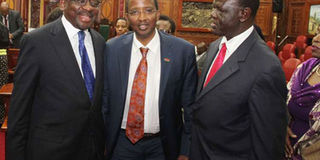Nothing wrong with IEBC move to cap campaign spending

Issack Hassan (centre), the chairman of the Independent Electoral and Boundaries Commission (IEBC), with Siaya Senator James Orengo (left) and Meru Senator Kiraitu Murungi, who are co-chairs of the joint parliamentary committee on matters relating to the IEBC, at County Hall in Nairobi on August 3, 2016. PHOTO | EVANS HABIL | NATION MEDIA GROUP
What you need to know:
If the Independent Electoral and Boundaries Commission had insisted that anyone without Sh10 million cannot be elected, then the storm would have been understandable.
After all, elective office cannot legally be the preserve of the wealthy and the mighty.
On the issue of campaign financing, some of us must be missing something. The debate on just how much can be allowed by the law to be spent during election campaigns seem to be anchored on a non-issue.
Quite beside the fact that the proposals were unleashed on us by a demonstrably lame-duck electoral commission, the whole furore reeks of propaganda.
It could be that the IEBC was being merely cantankerous – a cheeky attempt at tying an albatross around the necks of the next electoral commission, knowing very well that such strictures are impossible to implement, but I sincerely do not see what the brouhaha is all about.
It is not as if the IEBC is telling political parties to spend Sh15 billion on pain of dissolution if they don’t.
I am not sure the electoral commission is forcing any individual presidential contender to spend Sh5 billion on the campaign trail, failing which they will be barred from the race. In fact, it is understood that during the 2013 campaign, the major contenders spent far in excess of this figure, both in the ruling party and in the opposition.
The arguments put out can only make sense if some of those complaining are ready to spend Sh10 billion. But no. They are saying the upper limits are unrealistically high. Just who are they kidding?
What I believe the IEBC was doing was to cap the spending at a level it thought was realistic. But let us look at the issue this way. If you can spend Sh400 and deserve the right to be called governor, who is going to stop you? All that gubernatorial candidates are being warned against is to spend no more than Sh400 million!
ALREADY EXISTS
The campaign financing law already exists. In fact, it was passed just before the 2013 elections but never implemented. Not only is it concerned with regulating how much money is spent during campaigns but even more important, the source of that money. I don’t see why anyone wants to quarrel with that. As a country, it is necessary to ensure that our politics is not being fuelled with drug money and other vices.
The other thing we are not being told is that the IEBC is actually mandated by the Election Campaign Financing Act 2013 to do exactly what it did. The reason why this law was thought necessary was because during the 2013 campaigns, presidential contenders alone spent an estimated Sh50 billion. The body is also mandated to announce these spending limits exactly 12 months before the next elections, which it did. I ask again, where did it go wrong?
Certainly, excessive campaign spending is something that should worry Kenyans. Already, it has become clear that our democracy has become a market-place where leadership is brought and sold like so much merchandise and voter bribery is the order of the day. And for sure, if you do not have a few million bob stashed somewhere ready to disburse generously, you are not going to get that MCA seat. To reform our politics, we need to be honest with ourselves.
I don’t get it when a leader alleges that the move by the IEBC is a sinister ploy by Jubilee to launder money stolen from the public. Maybe it is, but the thrust of the argument seems to be that by setting the limits too high, the ruling elite wants to shut out those who cannot afford such astronomical sums. For all practical purposes, this argument is specious. In fact, it is sheer sophistry. Should the IEBC have side-stepped the issue and allowed everyone to spend what they can? But would that have stopped any laundering of dirty money?
In any case, there’s nothing new that the IEBC is saying. They have done so before without raising any hackles, so the problem must be in the timing and not the message. My own feeling is that the limits announced are way too high, thus giving the impression that elective offices must go to the highest bidder. But since that is already happening, where are those raising a stink coming from?
If the IEBC had insisted that anyone without Sh10 million cannot be elected, then the storm would have been understandable. After all, elective office cannot legally be the preserve of the wealthy and the mighty. But now, all this whining beggars belief.





